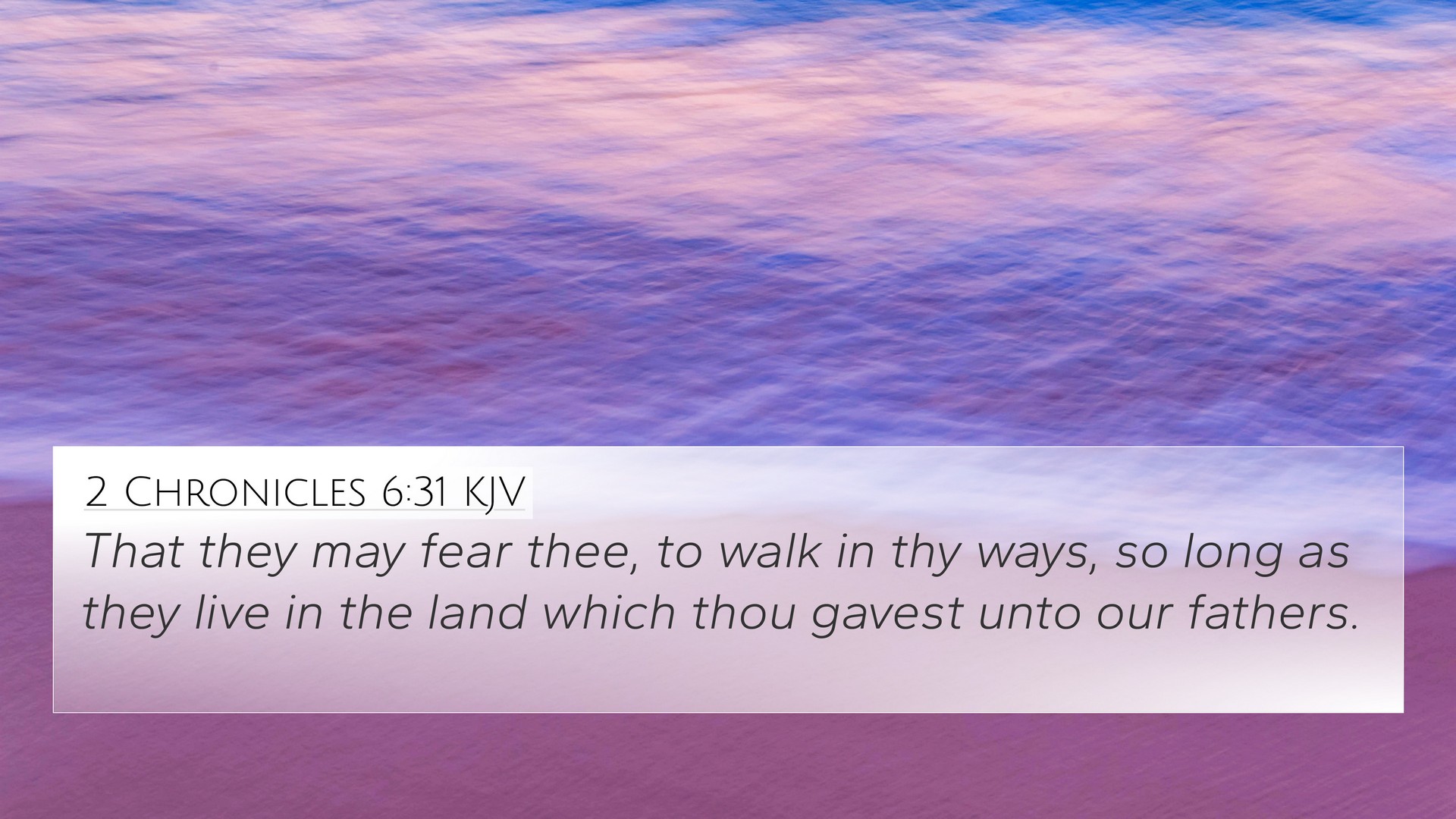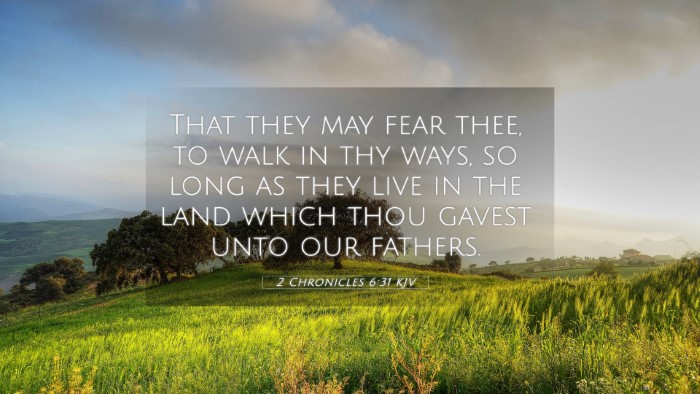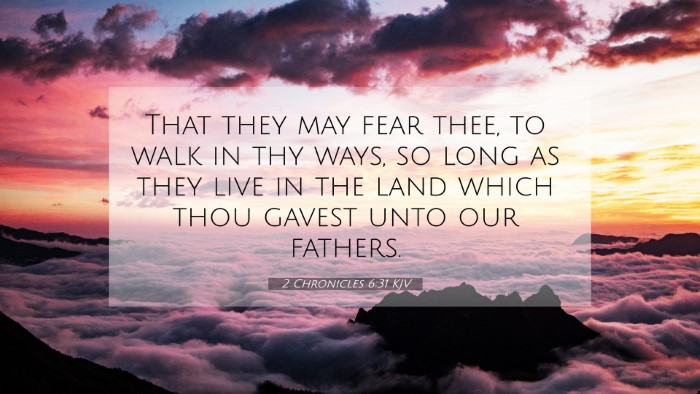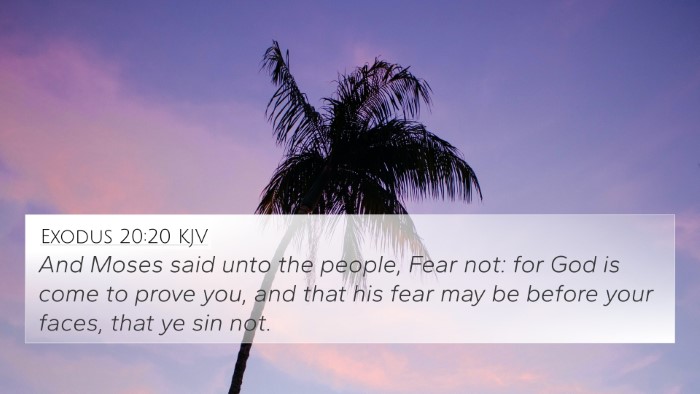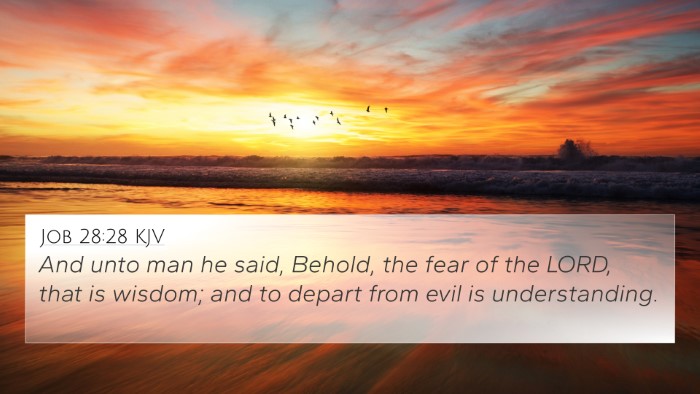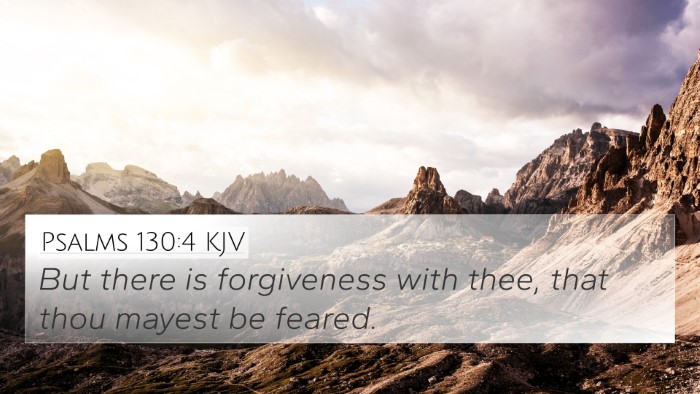Understanding 2 Chronicles 6:31
Verse (2 Chronicles 6:31): "That they may fear thee, to walk in thy ways, so long as they live in the land which thou gavest unto our fathers."
Commentary Summary
This verse from 2 Chronicles, part of King Solomon's prayer during the dedication of the temple, emphasizes a profound principle: the relationship between divine fear, obedience, and the blessings tied to the land given to the Israelites. Insights from renowned public domain commentaries provide a deeper understanding of its implications.
Matthew Henry's Commentary
Matthew Henry highlights that the verse expresses a wish for the people to have a reverent fear of God. This fear should lead them to walk in His ways, reflecting true obedience and worship. As they remain in the land, their prosperity and peace would depend on their faithfulness to God. Fear here is not merely terror but a reverential awe that leads to a committed lifestyle.
Albert Barnes' Notes
Albert Barnes notes that Solomon's desire for the people is that they might be consistently faithful. This faithfulness is tied to their acknowledgment of God's sovereignty and blessings. It emphasizes that true worship and faithful living are essential for maintaining stability in the land bestowed upon them.
Adam Clarke's Commentary
Adam Clarke states that the essence of this prayer is encapsulated in the call for a lifelong commitment to walking in God's ways. Clarke connects this obedience not only to personal piety but also to national welfare, suggesting that the collective actions of the people have repercussions on the land they inhabit.
Thematic Bible Verse Connections
This verse can be linked to several key themes across the Bible, reinforcing the necessity of obedience and divine fear in receiving God's favor. Here are some relevant cross-references:
- Deuteronomy 5:29: "O that there were such an heart in them, that they would fear me, and keep all my commandments always, that it might be well with them, and with their children forever!"
- Psalm 128:1: "Blessed is everyone who fears the LORD, who walks in his ways!"
- Proverbs 1:7: "The fear of the LORD is the beginning of knowledge: but fools despise wisdom and instruction."
- Isaiah 41:10: "Fear thou not; for I am with thee: be not dismayed; for I am thy God: I will strengthen thee; yea, I will help thee; yea, I will uphold thee with the right hand of my righteousness."
- Matthew 10:28: "And fear not them which kill the body, but are not able to kill the soul: but rather fear him which is able to destroy both soul and body in hell."
- Romans 12:1: "I beseech you therefore, brethren, by the mercies of God, that ye present your bodies a living sacrifice, holy, acceptable unto God, which is your reasonable service."
- 1 Peter 2:9: "But ye are a chosen generation, a royal priesthood, an holy nation, a peculiar people; that ye should show forth the praises of him who hath called you out of darkness into his marvelous light."
Exploring Connections Between Bible Verses
Understanding 2 Chronicles 6:31 in light of other scriptures enriches our spiritual insight. For instance, the correlation between fearing God and receiving blessings is a recurring motif in both the Old and New Testaments.
Linking Bible Scriptures
In linking 2 Chronicles 6:31 with verses like Deuteronomy 6:2 and Ecclesiastes 12:13, we observe the continual call for a life governed by the fear of God:
- Deuteronomy 6:2: "That thou mightest fear the LORD thy God, to keep all his statutes and his commandments, which I command thee, thou, and thy son, and thy son's son, all the days of thy life; and that thy days may be prolonged."
- Ecclesiastes 12:13: "Let us hear the conclusion of the whole matter: Fear God, and keep his commandments: for this is the whole duty of man."
Comparative Bible Verse Analysis
Through comparative analysis of these scriptures, we find that the fear of God is foundational not only for individual conduct but also for societal stability. They create a framework that encourages faithfulness to God as the path to prosperity.
Using Tools for Bible Cross-Referencing
Utilizing a bible concordance or a bible cross-reference guide can further assist in uncovering the layers of meaning in these related verses. Such tools enhance our understanding, allowing for the discovery of thematic Bible verse connections across various Biblical texts.
How to Use Bible Cross-References
To maximize the insights gained through cross-referencing, consult comprehensive resources to identify how different verses interact with one another. This method deepens your grasp of scripture and reveals the unified message contained within the diverse passages.
The Role of Inter-Biblical Dialogue
Through inter-Biblical dialogue, believers can engage with the foundational themes present in these related verses. By examining the overarching narrative, from the law to grace, we uncover a profound testament to God’s desire for His people to maintain a life of obedience characterized by a healthy fear of the Lord.
Conclusion
2 Chronicles 6:31 serves as a vital reminder of the call to fear God and walk in His ways. By cross-referencing this verse with others, we reveal a tapestry of commands and promises that highlight the intimate relationship between divine reverence and the blessings of God.
